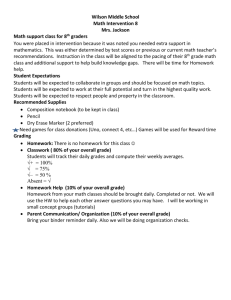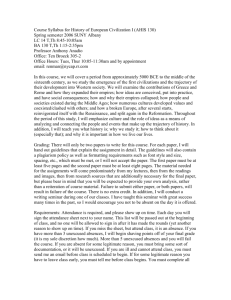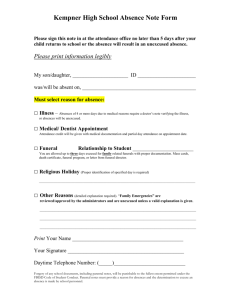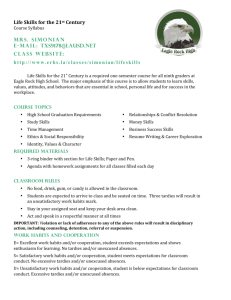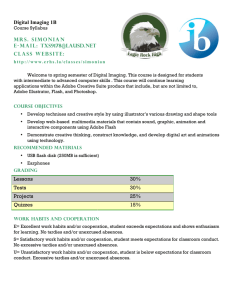AP English - La Jolla High School - San Diego Unified School District
advertisement
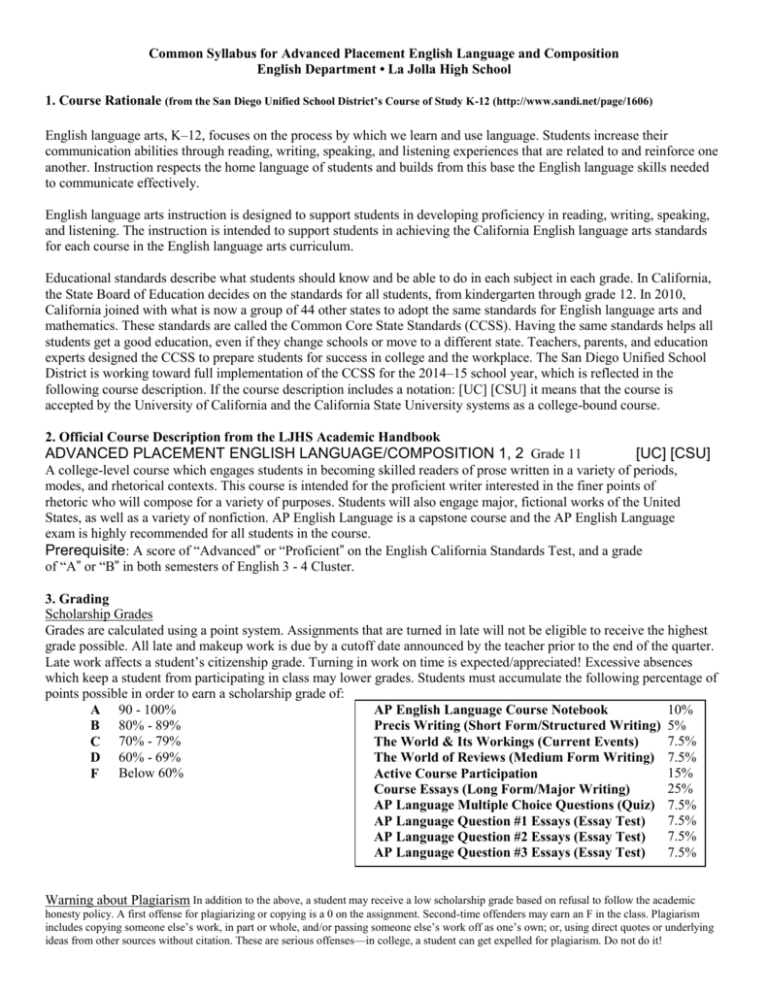
Common Syllabus for Advanced Placement English Language and Composition English Department • La Jolla High School 1. Course Rationale (from the San Diego Unified School District’s Course of Study K-12 (http://www.sandi.net/page/1606) English language arts, K–12, focuses on the process by which we learn and use language. Students increase their communication abilities through reading, writing, speaking, and listening experiences that are related to and reinforce one another. Instruction respects the home language of students and builds from this base the English language skills needed to communicate effectively. English language arts instruction is designed to support students in developing proficiency in reading, writing, speaking, and listening. The instruction is intended to support students in achieving the California English language arts standards for each course in the English language arts curriculum. Educational standards describe what students should know and be able to do in each subject in each grade. In California, the State Board of Education decides on the standards for all students, from kindergarten through grade 12. In 2010, California joined with what is now a group of 44 other states to adopt the same standards for English language arts and mathematics. These standards are called the Common Core State Standards (CCSS). Having the same standards helps all students get a good education, even if they change schools or move to a different state. Teachers, parents, and education experts designed the CCSS to prepare students for success in college and the workplace. The San Diego Unified School District is working toward full implementation of the CCSS for the 2014–15 school year, which is reflected in the following course description. If the course description includes a notation: [UC] [CSU] it means that the course is accepted by the University of California and the California State University systems as a college-bound course. 2. Official Course Description from the LJHS Academic Handbook ADVANCED PLACEMENT ENGLISH LANGUAGE/COMPOSITION 1, 2 Grade 11 [UC] [CSU] A college-level course which engages students in becoming skilled readers of prose written in a variety of periods, modes, and rhetorical contexts. This course is intended for the proficient writer interested in the finer points of rhetoric who will compose for a variety of purposes. Students will also engage major, fictional works of the United States, as well as a variety of nonfiction. AP English Language is a capstone course and the AP English Language exam is highly recommended for all students in the course. Prerequisite: A score of “Advanced” or “Proficient” on the English California Standards Test, and a grade of “A” or “B” in both semesters of English 3 - 4 Cluster. 3. Grading Scholarship Grades Grades are calculated using a point system. Assignments that are turned in late will not be eligible to receive the highest grade possible. All late and makeup work is due by a cutoff date announced by the teacher prior to the end of the quarter. Late work affects a student’s citizenship grade. Turning in work on time is expected/appreciated! Excessive absences which keep a student from participating in class may lower grades. Students must accumulate the following percentage of points possible in order to earn a scholarship grade of: 10% A 90 - 100% AP English Language Course Notebook B 80% - 89% Precis Writing (Short Form/Structured Writing) 5% 7.5% C 70% - 79% The World & Its Workings (Current Events) D 60% - 69% The World of Reviews (Medium Form Writing) 7.5% 15% F Below 60% Active Course Participation 25% Course Essays (Long Form/Major Writing) AP Language Multiple Choice Questions (Quiz) 7.5% 7.5% AP Language Question #1 Essays (Essay Test) 7.5% AP Language Question #2 Essays (Essay Test) 7.5% AP Language Question #3 Essays (Essay Test) Warning about Plagiarism In addition to the above, a student may receive a low scholarship grade based on refusal to follow the academic honesty policy. A first offense for plagiarizing or copying is a 0 on the assignment. Second-time offenders may earn an F in the class. Plagiarism includes copying someone else’s work, in part or whole, and/or passing someone else’s work off as one’s own; or, using direct quotes or underlying ideas from other sources without citation. These are serious offenses—in college, a student can get expelled for plagiarism. Do not do it! 4. Pacing Guide for AP English Language and Composition Quarter Curriculum Review of summer reading; introduction to the concept of symbolism; introduction argumentation and to the tools of rhetoric. 1 Unit 1: Everything Matters: an introduction to experiencing the worlds of literature, film, music, and art through a symbolic lens. Words and their Vicissitudes I: vocabulary building through the use of Latin and Greek roots, with an exploration of the history of words and the languages from which they come. The Manipulation of Language I: an exploration/review of commonly identified literary devices and their uses in literature, in argumentation, and as a part of every day language. Examples include: metaphor, personification, alliteration, and hyperbole. “Colombian New Style Writing” - writing in various modes, from different perspectives, and for different audiences. Essay writing in various modes, of various lengths, and from different perspectives (AP, Precis, Reflection, Review, Analysis, etc.). Reading, film clip, music, photograph, and art selections from both American and World Literature, including but limited to: Miller’s The Crucible, Springsteen’s “Brilliant Disguise”, U2’s “One”, Sting’s “They Dance Alone”, among others. 2 Unit 2: Everything Is An Argument: an introduction to the concept that every action, that every word, that every image, that every sound, is more deeply rooted in conscious thought than we might want to imagine, and the consequences of this reality. Words and their Vicissitudes II: vocabulary building through the use of Latin and Greek roots, with an exploration of the uses of words, the migration of words from one language to another, and the creation of new words (neologisms). The Manipulation of Language II: an exploration of/introduction to less commonly identified (but still widely used) literary devices and their uses in literature, in argumentation, and as a part of common, everyday language. Examples: anaphora, epistrophe, epizeuxis, and portmanteau. Essay writing in various modes, of various lengths, and from different perspectives (AP, Precis, Reflection, Review, Analysis, etc.). Reading, film clip, music, photograph, and art selections from both American and World Literature, including but limited to: Rostand’s Cyrano de Bergerac, a number of Hemingway’s short stories (including “The Revolutionist”, “Indian Camp”, and “The Short Happy Life of Francis Macomber”), and the works of the painters Giotto, Masaccio, Piero della Francesca, and Mantegna. Focused Supplementary “University” Reading and Film Project: supplementary research, study, and readings around a self-elected, parent and instructor approved theme. Examples: the Literature of Civil Rights in America; The New Japanese Novel: An Exploration of the Japanese Authors of the 21st Century; Never Again: The Literature of Genocide. Unit 3: And Dream of Sheep: an exploration of both Utopian, Dystopian, and Post Apocalyptic literature, film, music and art. Words and their Vicissitudes III: vocabulary building through the use of Latin and Greek roots, with an emphasis on roots tied to everyday life: the body, the home. The Manipulation of Language III: an exploration of/introduction to less commonly identified (but still widely used) literary devices related to styles of writing and discourse. Examples: epistolary, roman à clef, and bildungsroman. Essay writing in various modes, of various lengths, and from different perspectives (AP, Precis, Reflection, Review, Analysis, etc.). Reading, film clip, music, photograph, and art selections from both American and World Literature. Continuation of Focused Supplementary “University” Reading and Film Project. Summative Review/Interim Literacy Assessment from the District Final Exam: Complete practice AP exam. 3 Unit 4: El Maestro, The World of Gabriel Garcia Marquez (Author Study): an exploration of the works of Colombian author Gabriel Garcia Marquez, his home country of Colombia, and his created city of Macondo, Words and their Vicissitudes IV: vocabulary building through the use of Latin and Greek roots, with an emphasis on roots tied to topics and processes beyond the body and the home. The Manipulation of Language IV: a deepening exploration of less commonly identified (but still widely used) literary devices related to styles of writing and discourse. Examples: bowdlerization, travesty, eponym, and malapropism. Essay writing in various modes, of various lengths, and from different perspectives (AP, Precis, Reflection, Review, Analysis, etc.). Reading, film clip, music, photograph, and art selections from both American and World Literature. Continuation of Focused Supplementary “University” Reading and Film Project. Summative Review/Interim Literacy Assessment from the District 4 Unit 5: My Perfect World: an exploration of the future, of student life at university and beyond, with a primary emphasis on being cognizant of the expectations of universities, the Common Application recommendation process, and the beginnings of the College Essay. Words and their Vicissitudes V: vocabulary building through the use of Latin and Greek roots, with an emphasis on roots that go beyond daily life; Root Creation (creating a new word by inventing its form from scratch). The Manipulation of Language V: a deepening exploration of less commonly identified (but still widely used) literary devices related to styles of writing and discourse. Examples: pejoration, amelioration, and archaism. Essay writing in various modes, of various lengths, and from different perspectives (AP, Precis, Reflection, Review, Analysis, etc.). Reading, film clip, music, photograph, and art selections from both American and World Literature. Final Response: Focused Supplementary “University” Reading and Film Project. Unit 6: Final preparation for taking the AP English Language and Composition exam on May 13, 2015. Final Exam: The College Essay: a response to either the UC Essay prompts, the Common Application prompts, or a self-selected University Prompt for the 2015-2016 admission period. 5. Student Expectations for Success The extent to which a student will succeed in this course involves a combination of time management, goal-setting, and adherence to societal expectations regarding interaction with and respect for fellow students and staff. To have effective time management skills, maintain a calendar/planner and devote enough time each night to complete the homework, review concepts, and study, as well as read regularly for schoolwork and for pleasure. To meet goals, continue a cycle of self-reflection: what did I need to learn today (what was the purpose of the lesson), did I achieve the stated outcome, and what can I do to continue to improve/learn? To achieve success in the La Jolla High School environment, read the following descriptions of values, expected outcomes, and citizenship grade expectations, then act accordingly. Campus Citizenship Values These things are valued on campus: We all need R.O.O.M. Respect Ownership Open communication & patience Manners La Jolla High School's Schoolwide Student-Learner Outcomes (SSLOs) 1. Students will demonstrate effective oral and written communication skills, and will be able to use technology when applicable. 2. Students will develop the interpersonal skills necessary to work collaboratively, ethically, and effectively with others in order to be contributing members in a global society. 3. Students will be able to demonstrate the higher order thinking skills of analysis, synthesis, application, and evaluation. 4. Students will be able to demonstrate knowledge of the world's various viewpoints, belief systems, and cultures as well as American core values. Citizenship Grades To graduate from high school, and to participate in many extracurricular activities including athletics, you are required to maintain a 2.0 grade point average in citizenship. The following descriptions should provide a guide in determining what you can expect in this course. 4.0 E = Excellent 3.0 G = Good 2.0 S = Satisfactory 1.0 N = Not Satisfactory 0.0 U = Unacceptable To earn a citizenship grade of: E The student demonstrates the citizenship values above, consistently participates in class, and shows leadership qualities. The student has no G S N U warnings or reminders about behavior. The student consistently meets and often exceeds behavioral expectations. His/her absences are minimal and excused. The student follows classroom rules consistently and dependably. The student completes assignments on time. The student has fewer than four tardies. The student demonstrates the citizenship values above, participates a few times, has at most one reminder about behavior. The student typically displays positive behavior and contributes to the learning environment. The student is consistently on task and engaged. The student follows classroom rules. The student generally submits work on time. The student may have one to four tardies. The student may demonstrate citizenship values above, but his/her participation is inconsistent. The student has turned in late work more than a few times. The student is inconsistent about following classroom rules. The student has been warned about a recurring unacceptable behavior and has not corrected or changed his/her behavior. The student may have more than four tardies. The student may have one or two unexcused absences. The student does not demonstrate citizenship values above. The student frequently exhibits disruptive behavior and fails to follow classroom rules. The student is almost always late with assignments, or does not turn them in at all. Negative behavior patterns have not improved. The student may have more than five tardies. The student may have three unexcused absences. The student breaks classroom rules regularly (at least weekly, sometimes daily), and has received multiple warnings. The student makes little attempt to change his/her behavior. The student seldom completes work. The student may have more than 6 tardies, three or more unexcused absences (or one verified truancy), or has exhibited behavior in class that led to severe disciplinary action. Universal Tardy Policy First week of each semester Tardy grace period. One-on-one conference. Tardies will not be recorded and will not be applied to the consequences. 1-3 tardies The teacher gives verbal warning, institutes classroom-based consequences at the discretion of the teacher, and makes contact home (via e-mail, letter, or phone call). 4th tardy Citizenship grade lowered one grade. 5th tardy Teacher makes second contact with parent. 6th tardy Teacher writes referral for defiance. Counselor/administrator assigns afterschool detention. Beyond 6 tardies Further interventions may include lowering the citizenship grade to a U, additional referrals, parent conference, and/or Saturday school. Unexcused Absence Policy By the end of each quarter, teachers will check the absences records for students and count the number of unexcused absences. One to two unexcused absences may reflect a clerical error or failure by the parent to call in an excuse. But a third unexcused absence in a 9-week quarter shows a pattern of absences that will lower a student’s citizenship grade to an N. Four or more unexcused absences will earn the student a U. If an unexcused absence is verified as a truancy then the citizenship grade may drop immediately to a U. 6. Homework usually entails reading and some writing. Most homework involves long-term projects. Work not completed in class should be finished for homework. It is incumbent on the student to keep up with the reading and writing assignments. 7. Student Support Plan Before a unit of instruction begins: students will know the agenda, purpose, and targeted standard for the day. During instruction: Mr. Boyd will provide instructions in multiple ways. Students will be able to ask for assistance or clarification. Many activities will involve dyads or triads, so students will work cooperatively. Several essays will involve multiple drafts with students selecting which first draft they wish to revise. Mr. Boyd is available before school (6:30 AM), at lunch, and after school until 3:00 for additional assistance. After assessment: Mr. Boyd is available at the above times for one-on-one feedback so students can improve their skills. A Few Musings, Truths, and Understandings… AP English Language and Composition La Jolla High School (2014-2015) Mr. Robert J. Boyd (1-858-454-3081, ext. 4514; room 514; rboyd@mail.sandi.net) Philosophy: We are a cutter on the seas of fate, kith and kin to both Dante and Odysseus in our journey to make sense of our part in the human drama; to both Don Quixote and Colonel Aureliano Buendia in our plaintive search for a salve to help soothe the wounds wrought by the plight of the human condition; and to all others past and present whose lives have taken them on separate quests of understanding—whether they have been/are literal or figurative, the journeys and the questions raised (and sometimes answered) by them are the things of greatest import when it comes to this course. This is how I picture the course when I see it in my dreams and not through the imperfect lens of everyday reality. It is the journey, not the destination (though that’s usually very nice, too), that matters the most to me, because it is on the journey that we begin to question and, hopefully, to understand who we are and what it is that we want for ourselves in our lives and in our world. It is why in my Advanced 10th grade English classes I work with the general ideas of exploration and discovery, using literature that deals with characters who are in some way trying to define and/or discover their place in the world (Hugo’s Les Miserables, Camus’ The Stranger, Dante’s Inferno, Homer’s The Odyssey, and Cervantes’ Don Quixote, among others). It is why in my 11th grade AP English classes I work with the general theme of “My Perfect World”, using literature that deals with characters who have in some way lost touch with their separate “perfect” worlds and who are now somehow trying to either build (or rebuild) the bridges that will take them back to those worlds or to newer and as yet undiscovered countries (Marquez’s One Hundred Years of Solitude, McCarthy’s The Crossing, Roth’s American Pastoral, Fitzgerald’s The Great Gatsby, Ellison’s Invisible Man, Theroux’s The Mosquito Coast, and Murakami’s A Wild Sheep Chase, among others). It is why in my 12th grade AP English classes I work with the more intimate theme of “Who am I?”, using literature that deals with characters who have come to some crossroads in life and whose decisions (or momentary lapses or reason, as may be the case) will determine forever how they will be seen by the world and those around them (Shakespeare’s Hamlet, Ishiguro’s Never Let Me Go, Shaffer’s Equus, Marquez’s Love in the Time of Cholera, Saramago’s Blindness, Morrison’s Beloved, and Coetzee’s Disgrace, among others). It is all, in the end, in preparation for the future: not just to have students who are as well-prepared as they can be for the different standardized tests that will be coming down the line, particularly the two different AP English tests, but also for the tasks that will be set for them when they begin to apply for admittance to university and for the various scholarship programs available to them. It has always been true, and probably will continue to be true in some way, shape or form, that universities and scholarship committees always seem to want to know two things about each year’s new crop of applicants: (a) what adversities they have had to overcome in their eighteen years of life (i.e., what events have taken them away from maintaining their otherwise perfect worlds); and (b) what events, activities, triumphs, and traumas, etc., help to explain who they are and why they are the people they are today. AP English “Givens” (i.e., if these sentences don’t describe you, then academic trouble may be looming on the horizon): (a) reading is a part of your natural life and you do it very well; it is a pleasure for you, not a chore, even when it is handed down to you as an assignment; (b) the types of books that you read are varied in their nature, their length, and their subject matter: i.e., though you may have a favorite genre of literature (graphic novels, high fantasy, thriller, romance, Latin American, Asian, etc.), you are adventurous when it comes to reading and do not allow yourself to be locked into reading in that genre alone and also do not shy away from reading lengthier works; (c) you recognize that AP English is meant to be a university level literature course—after all, you do receive some university credit for successfully passing the AP English test—and that you will be exposed to university level books that may be of a more cerebral nature than you are used to, either in your own reading or in the reading done in the Advanced English classes offered here at La Jolla: i.e., they (the books we will be using) are generally more thoughtful, intellectually provocative works that are harder to get through than your average thriller; and (d) writing in a thoughtful and interesting manner is a skill you already possess on some level—AP English is not meant to be a course where you learn how to write but one where you take your already good writing skills and improve upon them, fine-tuning them for different purposes and different audiences. Understanding: The advanced nature of this course will require of each student in it a level of desire, discipline, maturity, and behavior commensurate to its goals: to immerse them all in the types of writing, reading, thinking and reasoning skills necessary for success in university level literature courses. This being the case, problems in terms of work habits, promptness, and/or behavior will not be allowed to disrupt the normal functioning and stated purposes of this course, especially if such problems impinge in any way on the rights of the other students in the course to receive the type of education expected by their parents from an institution like La Jolla High School or from any of its immediate rivals, local or nationwide. Yes, we are still in the high school setting, but students who enroll in any of the AP or Mesa College courses here at La Jolla are doing so with the understanding that they are supposed to be entering into a more serious, mature, and thoughtful atmosphere in those courses and that their behavior as individuals and their seriousness as students are both expected to match that elevated atmosphere. In essence, all of those things about high school that everyone on some level eventually gets tired of, which has everyone wanting high school to end and university life to begin, are supposed to be checked at the door. No class clowns. No rude side conversations about anything. No doing of homework from other courses. No juvenile or disruptive behavior of any kind. After all, if this were a real university setting and my parents and I were shelling out between $15,000 and $70,000.00 a year for me to be here…. You get the picture. Gossip between classes or during lunch time. Offenders of the peace will be asked to leave. Reading (Pace and Content) and Writing (Pace): Students enrolled in this course should expect a reading load of approximately one hundred twenty-five to one hundred fifty pages a week and a writing load of approximately one formal paper or test every three to four weeks. The reading to be covered in this course (see below) will prove itself to be, I believe, not only challenging and (at times) provocative, but also rewarding, enlightening, and (I hope) unforgettable. PARENTAL ADVISORY: Please remember that the name of this course is “Advanced Placement English Language”. It is meant to be, and I intend to conduct it as, the equivalent of a university level literature course that can eliminate one, and possibly several, English and/or Literature courses at the university level. Having said this, please be aware that mature subject matter will at times be a part of both the readings for this course and of our class discussions. Please also be aware that all of the short stories and novels that will be used as a class in this course are in line with the College Board’s AP English Language and Literature expectations and have been chosen with care. The College Board encourages the use of texts from a wide and varied world “pantry”, with a healthy sampling of classic texts, yes, but an even broader push toward the modern and issues that may be more central to our lives in the here and now. Please be aware, however, that in using more modern texts that the issues of everyday life (death, violence, language, divorce, alcoholism, sexuality) can at times be dealt with more graphically than in a classic text. To make an analogy based on some of the better series being run on television right now: where would Breaking Bad, House of Cards, Battlestar Galactica (new version), Louie, True Detective, Mad Men and Game of Thrones be without the core of what makes them what they are? Supplementary Texts (may include): One Hundred Years of Solitude, No One Writes to the Colonel, and either Of Love and Other Demons, The General in His Labyrinth, or Collected Stories (Gabriel Garcia Marquez); American Pastoral (Philip Roth); The Crossing (Cormac McCarthy); The Great Gatsby (F. Scott Fitzgerald); Snow Country (Yasunari Kawabata); The Complete Short Stories (Ernest Hemingway); Beloved (Toni Morrison); The Adventures of Huckleberry Finn (Twain); Haroun and the Sea of Stories (Salman Rushdie); A Wild Sheep Chase (Haruki Murakami); The Awakening (Kate Chopin); A Streetcar Named Desire (Tennessee Williams); and Invisible Man (Ralph Ellison); among others. Individual Assignment Grades are determined through the use of a 9-point AP (Advanced Placement) style rubric. Raw assignment scores for individual assignments (the 1 through 9 of the rubric) are awarded to each assignment for its merits and then converted to points using a scale similar to the Individual Assignment Scoring Rubric presented below (I say “similar” because this particular scale is for an assignment worth 100 points). Sample student essays created for different tasks and audiences graded against this 9-point rubric will be presented to students as models to emulate (when available) in their own work. Individual Assignment Scoring Rubric 9+ 9 98+ 8 87+ 7 7- = = = = = = = = = 100 98 96 94 92 90 88 86 84 = = = = = = = = = A+ A+ A A AAB+ B B 6+ 6 65+ 5 54+ 4 4- = = = = = = = = = Scholarship Grade 82 80 78 76 74 72 70 68 66 = = = = = = = = = BBC+ C C CCD+ D 3+ 3 32+ 2 21+ 1 1- = = = = = = = = = 46 44 42 22 20 18 08 06 04 = = = = = = = = = F F F F F F F F F 97 93 90 87 83 80 - 100 96 92 89 86 82 = = = = = = A+ A AB+ B B- 77 - 79 = C+ 73 - 76 = C 70 - 72 = C67 - 69 = D+ 63 - 66 = D 60 - 62 = D-------------------00 - 59 = F Online Expectations: (1) student grades will be posted on Power School and will be updated on a regular basis; (2) students are expected to submit many assignments to turnitin.com, and so are expected to create a school account (if they have not already done so) and add the appropriate course to their account; and (3) students are expected to remain current with all assignments and are expected to create an account at classjump.com so that they can do so. Further information on turnitin.com and classjump.com will be sent home during the first week of school.

